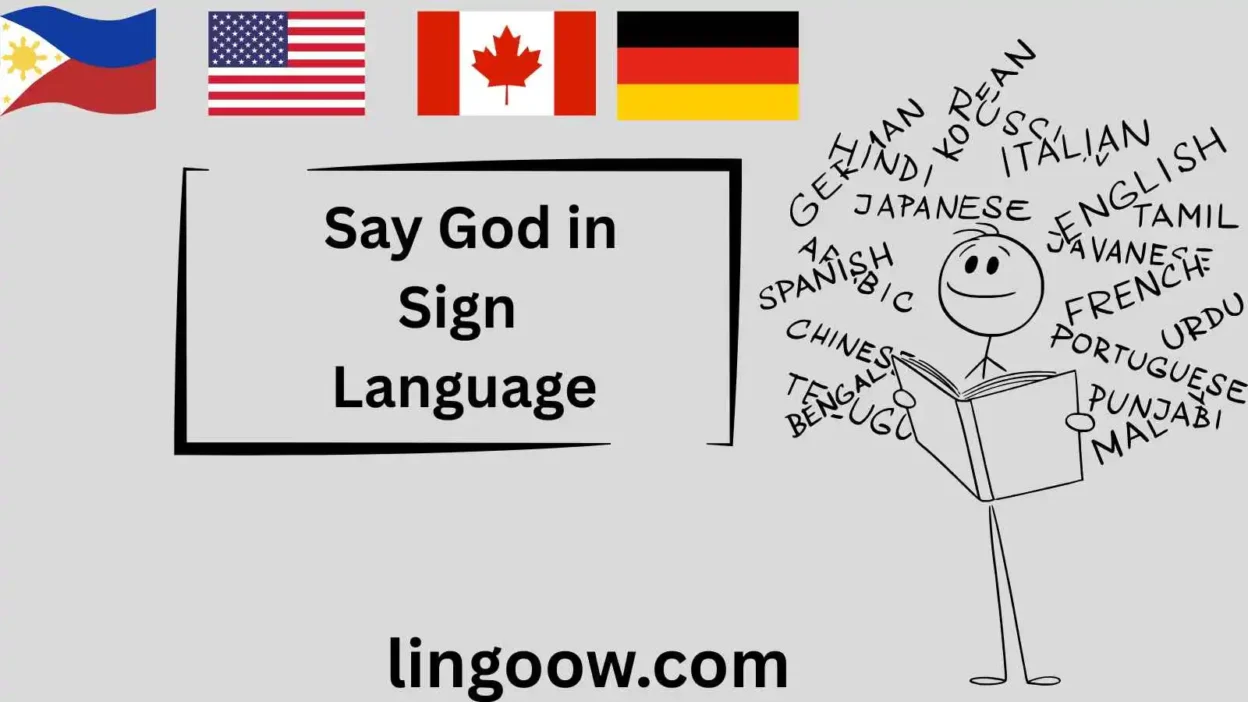I still remember the moment clearly.
I was sitting in a small café in Paris, watching a deaf couple across the room argue passionately—without a single sound.
Their hands flew like birds, sharp and graceful. Suddenly, the woman stopped, softened her face, and lifted her right hand to her forehead, then brought it down in a gentle arc toward the sky.
Her partner’s eyes filled with tears. In that instant, I understood: she had just signed “God.”
No voice. No shared spoken language with me. Yet the weight of that single sign crossed every barrier and landed straight in my chest.
That’s the strange miracle of the word “God.” Whether whispered, shouted, signed, or sung, it carries the same ache of wonder in every corner of the planet. Today, let’s travel the globe—not just to collect translations, but to feel how different cultures cradle the same mystery.
First, How Do You Actually Sign “God”?
In American Sign Language (ASL):
- Make a “B” handshape (open hand, thumb tucked).
- Start at the forehead or chin (honoring the divine), then move the hand upward and outward into the sky. It’s a gesture of reverence—lifting something holy away from the earthly.
In British Sign Language (BSL), French Sign Language (LSF), and many others, the sign is similar but often starts higher and ends with both hands open toward heaven.
Now, let’s listen to the world speak (and sign) the unspeakable.
A Quick-Reference Table
| Language | Word / Phrase for “God” | Pronunciation (approx.) | Cultural/Linguistic Note |
| English | God | god | Originally from Proto-Germanic *ǥuđan |
| French | Dieu | dyø | From Latin deus – same root as “deity” |
| Spanish | Dios | dee-OS | Everyday speech; “¡Ay Dios mío!” is the Spanish “Oh my God!” |
| Italian | Dio | DEE-oh | Used in opera, prayer, and passionate cursing alike |
| German | Gott | got | Famous in Bach’s “Gott ist mein König” |
| Portuguese | Deus | DEH-oos | Brazil: “Graças a Deus” = Thank God |
| Dutch | God | hot (with guttural ‘g’) | Same spelling as English, different sound |
| Swedish | Gud | good | Minimalist and matter-of-fact |
| Russian | Бог (Bog) | bohk | Soft, almost whispered in Orthodox liturgy |
| Greek | Θεός (Theós) | theh-OSS | The word used in the New Testament |
| Latin | Deus | DEH-oos | Root of “deity,” “divine,” “adios” |
| Hebrew | אֱלֹהִים (Elohim) / יַהְוֶה (YHWH) | el-oh-HEEM / Yah-weh | Elohim is plural of majesty; YHWH is the sacred unpronounceable name |
| Arabic | الله (Allah) | al-LAH | Literally “The God” – used by Muslims, Arab Christians, and Jews |
| Turkish | Tanrı / Allah | TAHN-ruh | Tanrı is pre-Islamic Turkic sky god; Allah is Quranic |
| Persian (Farsi) | خدا (Khoda) | kho-DA | Poetic: Hafez and Rumi sing of the Beloved (Khoda) constantly |
| Hindi | भगवान (Bhagavān) / ईश्वर (Īshwar) | bhug-VAHN / EESH-var | Bhagavān = “possessor of all fortunes” |
| Sanskrit | देव (Deva) / ब्रह्मन् (Brahman) | DAY-vah / BRUH-mun | Deva = shining one; Brahman = the ultimate reality |
| Mandarin Chinese | 神 (Shén) / 上帝 (Shàngdì) | shen / shahng-DEE | Shén = spirit/god; Shàngdì = ancient High God of Chinese tradition |
| Japanese | 神 (Kami) | KAH-mee | Not one supreme being—thousands of kami in Shinto |
| Korean | 하나님 (Hananim) | hah-nah-neem | Used by Korean Christians; native word is 하늘님 (Haneulnim) = Sky Lord |
| Thai | พระเจ้า (Phra Chao) | pra-CHAO | Literally “Sacred Lord” |
| Vietnamese | Chúa / Thượng Đế | choo-ah / thoo-uhng DAY | Chúa used by Catholics; Thượng Đế = Highest Emperor |
| Swahili | Mungu | moo-ngoo | Bantu root; used across East Africa by Christians and Muslims |
| Zulu | uNkulunkulu | oon-koo-loon-KOO-loo | “The Very Great One” – ancestor of all |
| Yoruba (Nigeria) | Olódùmarè | oh-loh-DOO-mah-ray | The Owner of the Womb of Creation |
| Amharic (Ethiopia) | እግዚአብሔር (Egziabher) | eg-zee-ah-BE-hair | “Lord of the Universe” |
| Hausa (West Africa) | Allah / Ubangiji | oo-bahn-GEE-jee | Ubangiji = The Supreme One |
| Maori (New Zealand) | Atua / Io | AH-too-ah / EE-oh | Io-matua = the supreme hidden god in some traditions |
| Hawaiian | Akua | ah-KOO-ah | Same Polynesian root as Maori |
| Samoan | Atua | ah-TOO-ah | Used for the Christian God and ancient deities |
| Cherokee | ᎦᎴᏂᏴ (Galvladi) / ᎡᏆᎭᏂ (Equani) | gah-luh-lah-dee | “One Above” or “Great Spirit” |
| Navajo (Diné) | Diyin | dee-YIN | Holy People / Holy Beings |
| Inuit (Inuktitut) | Silap Inua | SEE-lap EE-noo-ah | “Owner of the Sky/Universe” |
| Quechua (Andes) | Apu / Pachakamaq | AH-poo / pah-chah-KAH-mak | Pachakamaq = Earth-Maker |
| Mayan (Yucatec) | Ku / Itzamná | koo / eet-sam-NAH | Ku = the hidden god behind all |
(And we could go on—Tagalog’s Bathala, Mongolian’s Tengger, Finnish’s Jumala… the list never really ends.)
European Voices
In most European languages, the word traces back to two ancient roots: the Latin deus (French Dieu, Spanish Dios) or the Germanic gott/gud (English God, German Gott). Yet the feeling changes.
In Italy, you’ll hear old women cross themselves and whisper “Dio mio” when a child narrowly avoids a scooter. In Russia, Orthodox priests chant “Gospodi pomilui” (“Lord have mercy”) in a low rumble that vibrates in your ribcage. The same idea, a thousand shades of awe.
Asian Echoes
Asia refuses to pick one story.
In Japan, kami are in the cedar tree, the mirror, the sumo ring. When a Japanese person claps twice at a shrine, they’re greeting a god that might be a mountain.
In India, a grandmother might call the divine Bhagavān one moment and Mā (Mother) the next. The same lips that say “Ram” in devotion might curse “Bhagavān!” when the bus is late—proof that the holy and the human are never far apart.
African Names That Carry Creation Itself
In many African traditions, God is not a king on a throne but the First Ancestor, the Great Spider, the One Who Was There Before “Before.”
Yoruba priests in Ile-Ife still pour palm wine on the earth for Olódùmarè, thanking the Owner of Life for another sunrise. Zulu sangomas speak of uNkulunkulu with the same reverence they speak of the oldest baobab—ancient, unshakable, part of the family.
Indigenous & Island Songs to the Great Mystery
From the Navajo concept of sa’ą́ą́’ naagháíí bik’eh hózhǫ́ (the eternal harmony walked in beauty) to the Hawaiian understanding of akua as mana-filled beings of land and sea—these are not “early” gods. They are relationships. The mountain is not a symbol of God; the mountain is a relative who is also divine.
Proverbs That Made Grandmothers Wise
- Arabic: “Tawakkul ‘ala Allah” – Put your trust in God (but tie your camel first).
- Spanish: “A Dios rogando y con el mazo dando” – Pray to God, but keep swinging the hammer.
- Yoruba: “Ori l’ọba ọlọrun” – Destiny is the king, but God is the owner of destiny.
- Japanese: “Kami no ryouiki” – Even God has domains he doesn’t enter (meaning: mind your own business).
- Russian: “Na Boga nadeysa, a sam ne ploshai” – Hope in God, but don’t mess up yourself.
- Maori: “Whakapono” – To believe is to make the unseen solid under your feet.
Frequently Asked Questions
Why do so many languages have similar-sounding words?
Because of shared ancient roots. Most Indo-European languages (from Ireland to India) come from the same Proto-Indo-European sky-god Dyēus Ph₂tēr (literally “Sky Father”). That’s why Zeus, Jupiter (Dyaus-piter), and even the Vedic Dyaus sound alike.
What’s the oldest written name for God?
Probably the Sumerian dingir (𒀭) around 3000 BCE, or the Egyptian nṯr (netjer) hieroglyph of a flag on a pole.
Do all cultures have a word for “God”?
Not exactly. Some Australian Aboriginal traditions speak of the Dreaming—creative ancestors who are still present—without a single supreme being. The Pirahã people of the Amazon famously have no creation myth and no word for an abstract “God.”
A Final Whisper
Every night, somewhere, a child asks, “Who made the stars?”
In a thousand languages the answer begins the same way: with a word that tastes like wonder and feels like home.
So tell me—what is the word you grew up hearing?
Was it Allah whispered in your grandmother’s dua?
Dios in your mother’s lullaby?
uNkulunkulu in your father’s stories around the fire?
Drop it in the comments. Let’s keep adding to this never-ending prayer.
Because as different as our words are, the silence after we say them…
that silence is exactly the same.

Luna-Gracelyn, the creative mind behind Lingoow.com, writes with passion and clarity.
As a professional author, she simplifies complex topics for readers worldwide.
Her work inspires, educates, and connects people through powerful, easy-to-understand content.




